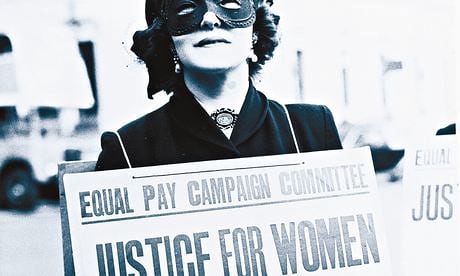 With gender pay equality very much back in focus in the advertising and media industries, Alan Coleman explains how the industry can address the issue.
With gender pay equality very much back in focus in the advertising and media industries, Alan Coleman explains how the industry can address the issue.
This has been a difficult piece to write. I considered writing it at the time of “Equal Pay Day” back on April 4th, but I chickened out. The strange thing is, I didn’t chicken out because I was going to reveal figures portraying Wolfgang Digital as sexist, anything but. I chickened out because I was worried that in speaking on the subject of gender equality, I would unwittingly say something that would make me look like a dick. I guess that’s how unconscious bias works. You don’t realise you are being a dick until it’s pointed out to you and that can be hard to take. Sometimes it’s safer to stay shtum.
I’ve decided to bite the bullet and press publish. There might be the odd faux pas, or I might reveal an unfair assumption I harbour, but I believe it’s more important that we join the conversation. I got a lot of encouragement from people in Wolfgang Digital to publish it and I know that two of my digital marketing heroes, Rand Fishkin and Wil Reynolds, are vocal on the matter. I decided to enter Wolfgang Digital into the #genderpayequality conversation.
I must admit I am only becoming informed on the gender pay equality issue of late. There is still much I don’t know. This analysis is an early step in our journey, searching for gender balance. Actually, in writing this I realised that a hiring strategy I adopted in the early years of Wolfgang Digital, a strategy which I have always referred to as visionary, was, in fact, creating and then doubling down on an unconscious bias. The cumulative effect of that bias in hiring all those years ago has had a dramatic effect on the very top layer of our organisation today. Thankfully we’ve made progress since then. Here’s our story.
On April 4th 2017, Equal Pay Day, we carried out an analysis of the Wolfgang guys and gals’ salaries. To ensure we were comparing like with like, we compared digital marketers and non-digital marketers at a similar level of the organisation.
Here’s how we fared.
Male and Female Pay
Over the 29 salaries analysed, we found we were actually paying females 1% more than we were paying males. 1% is such a small difference I think we can consider this to be balanced. What it should be. Happy days.
So how did this occur? Did we proactively bake gender pay equality into our pay policy? We couldn’t have, we weren’t aware of the concept when creating our pay structure. Here’s my take on the how.
We hire based on our own salary scale and we are pretty rigid with it (this costs us applicants at the interview stage but qualifies out people who will jump ship at the first sniff of a Facebook-sized salary). Adhering to our salary scale for new hires nullifies pre-existing pay disparities at the door. We then offer a pay review every six months where everybody has the opportunity to get a same sized salary increase if a number of very clear metrics are hit. This focus on objective measurables serves to minimise “unconscious bias” at the pay review stage.
So we can’t take credit for consciously inventing a pay structure to eradicate pay inequality. We created a payment structure that rewards results.
As a performance agency, results are our raison d’être. As such, performance appears in every facet of our organisation. In the highly-charged and emotive area of pay reviews, we’ve tried to increase transparency and remove subjectivity. I guess by focusing on performance-based pay, we’ve unwittingly created a pay structure that reduces gender pay inequality.
We’re paying based on numbers. Numbers don’t have gender and therefore gender bias has less oxygen in a metric-driven meritocracy.
I feel it’s important I highlight the less oxygen part of this statement. I understand gender bias might mean a female Wolfganger sometimes has to spend more time answering client questions or work a bit harder to get a proposal over the line to hit those numbers. So, while there is minimal bias in the performance appraisal, there may be occasions where it is present in performance execution.
As I’m only beginning to wrap my mind around this issue, I have no immediate solutions I’m afraid. But I now know it matters and that’s a start.
Male and Female Employees
As well as looking at like-for-like pay, we looked at gender breakdown. 48% of the salaries analysed were females and 52% were males. I’m particularly happy with this new found balance. At department head level we are now 60% female, however, at board level we’re only 20% female. I figure this disappointing imbalance at board level is a legacy of the early days Wolfgang Digital, in which the majority of our hires sported shlongs.
It’s actually only now, in the process of writing this, that I’ve wrapped my head around why this happened. Let me explain how Wolfgang Digital started out life predominantly hiring males.
In 2009, nobody had digital marketing skills. If I couldn’t hire people with the skills, I needed to hire people with the raw materials. I’d found I had an aptitude for Google AdWords because I was always mad for data-driven strategy games, such as fantasy football, Championship Manager and chess.
My first hire, Ed, had no background in marketing, let alone digital marketing. He was, however, better than me at both chess and fantasy football. I figured this would make him shit hot at Google AdWords. I was quickly proven right! My eccentric recruitment policy was a winner. I’d figured out a way of hiring talented digital marketers, solving what was and still is, the biggest issue in the industry. Of course, looking back now I can see the methodology significantly favoured football fans, who are, of course, mainly male.
I then doubled down on my unconscious bias! I went out hiring, looking for people who fit my male focused criteria and reminded me of Ed! This demonstrated a really scary self-perpetuating, or worse, self-enhancing element to unconscious bias.
By the time we reached ten people we were worryingly male dominated. We knew nothing about the gender equality issue at that time, we just knew this was unnatural and we started taking steps to address this.
Thankfully at all levels of the organisation apart from board level we’ve balanced out that numerical gender imbalance. So, let’s talk about the board.

Imbalance at Board Level
One of the reasons Wolfgang has successfully scaled up lies within our people’s ability to grow with the company. We’ve nearly always been able to fill senior positions internally as they arise. However, the downside of this phenomenon is that the dregs of the frankfurter fest that was Wolfgang’s early years can still be seen at board level. Where we are four males to one female. All five directors were among the first eight hires you see. Deborah, our female director, is a well-informed feminist and there’s no doubt her voice at board level has helped us redress the imbalance in the organisation.
In summary, I’m happy that we’re paying females and males the same salaries for the same work. I’m not jumping up and down now. This seems a barmy thing to be getting too excited about, but given the context of females getting 16% less than males across Europe, it warrants noting. The “work on” area is the numerical imbalance we have at board level, but the fact that the next level down from the directors is 60% female encourages me that we are on the right path. This couldn’t have happened in Wolfgang Digital five years ago, and I’m determined that as more positions emerge at the top of Wolfgang businesses, we will find that balance there too.
The advice I’d give to any business people reading this article interested in gender pay balance is simply run the calc. Are you paying females the same as males for the same role? If you are nervous about running the calc, that’s good news, you are aware there might be an imbalance and are already moving beyond “unconscious” bias.
I believe the majority business people are decent people who believe in fairness, egalitarianism and merit. If decent people move from unconscious bias to conscious bias, they will no longer be able to tolerate that bias in their own mind, and a change in behaviour is certain to ensue.
Alan Coleman is managing director and founder of Wolfgang Digital.
First published in Irish Marketing Journal (IMJ July/August 2017)© to order back issues please call 016611660




















